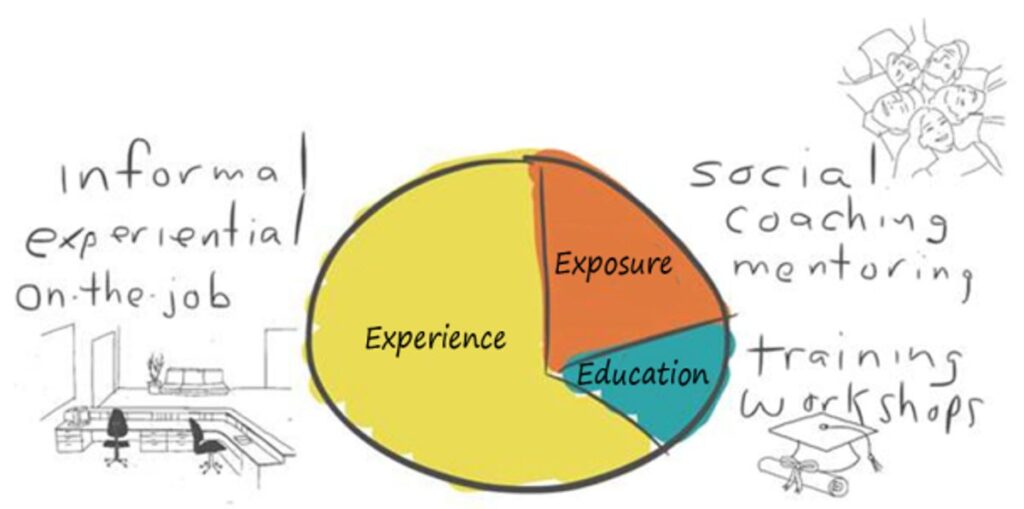Mentorship is a powerful tool for personal and professional growth, and it can often be likened to navigating a ladder with ropes and stairs. Just like climbing a ladder, achieving success and growth requires steps, support, and guidance. In this article, we’ll explore the dynamics of mentorship, how it functions like a ladder, and the vital role ropes (support) and stairs (action) play in helping individuals reach their goals.
Introduction
Mentorship is a relationship where an experienced individual (mentor) provides guidance, support, and advice to a less experienced person (mentee) to help them achieve their personal or professional goals. The mentor provides the ropes that help the mentee climb the ladder of success. The ladder represents the structure of growth, with the steps symbolizing progress and the ropes offering the safety and support needed to continue climbing. This metaphorical representation of mentorship highlights its importance and the two-way nature of this relationship.
The Role of Mentorship: A Ladder to Success
Mentorship is often seen as a guiding light for individuals striving to advance in their careers or personal lives. Just as a ladder provides a structured pathway to reach new heights, mentorship offers the steps necessary to progress toward success.
Stairs: The Steps to Personal and Professional Growth
Every individual’s journey towards success is unique, but mentorship ensures that the steps taken are productive and lead to positive outcomes. Just like a ladder has distinct steps to follow, mentorship helps mentees establish a clear, actionable plan to achieve their goals. A mentor provides structure and accountability, helping mentees break down large objectives into manageable tasks. These steps lead to consistent growth and development.
The beauty of mentorship lies in its ability to tailor these steps to the mentee’s specific needs and ambitions. Whether it’s climbing the corporate ladder, advancing in one’s academic career, or improving personal skills, the mentor helps define the necessary steps.
Rope: The Support That Keeps You Safe

Mentorship is not just about setting goals and providing a roadmap. It’s also about offering the support and reassurance that one needs to face challenges. Think of the rope as the safety net that protects the mentee as they climb the ladder. It represents the emotional, psychological, and practical support mentors provide.
The rope is what keeps mentees from falling when faced with setbacks, frustrations, and failures. Life is filled with unexpected challenges, and without a strong support system, it can be difficult to navigate them. A mentor becomes a steady hand that encourages resilience, persistence, and adaptability.
When a mentee struggles or doubts their ability to succeed, the mentor can provide wisdom, encouragement, and guidance to help them overcome obstacles. Just as a rope keeps a climber safe while ascending a dangerous ladder, mentorship provides the safety net that encourages growth despite fears and uncertainties.
Pros of Mentorship: Reaching New Heights with a Ladder

Mentorship offers a multitude of benefits that can positively impact both the mentee and the mentor. Here are some of the most significant advantages:
- Accelerated Learning: Mentorship allows individuals to bypass common pitfalls and mistakes. Mentors share valuable knowledge gained from experience, which helps mentees avoid unnecessary delays and speed up their learning process.
- Increased Confidence: With the guidance and support of a mentor, mentees gain confidence in their abilities. Knowing that someone believes in their potential provides the encouragement needed to take on new challenges.
- Career Advancement: A mentor’s advice and guidance can open doors for career advancement. Whether it’s recommending professional opportunities, sharing industry insights, or providing introductions, mentors help mentees advance their careers faster.
- Personal Development: Mentorship also plays a significant role in personal growth. By offering advice and coaching, mentors help mentees develop important life skills such as communication, decision-making, and leadership.
- Networking Opportunities: A mentor often introduces the mentee to a network of professionals or industry contacts. These connections can play a vital role in the mentee’s professional growth and open up new avenues for learning and collaboration.
- Increased Accountability: A mentor helps keep the mentee accountable for their actions, ensuring that they stay focused and on track to achieve their goals. This accountability often leads to higher levels of productivity and success.
Cons of Mentorship: Navigating the Ladder’s Challenges

While mentorship is incredibly beneficial, there are some challenges that can arise from the relationship. Here are some potential drawbacks:
- Mismatch Between Mentor and Mentee: Sometimes, a mentor and mentee may not be compatible in terms of personality, communication style, or goals. This mismatch can hinder progress and cause frustration on both sides.
- Overdependence: Relying too heavily on a mentor can lead to an unhealthy dependency. Mentees may struggle to make decisions or take independent action if they are always seeking guidance from their mentor.
- Time Commitment: Mentorship requires a significant time commitment from both the mentor and the mentee. If either party is too busy or unable to dedicate sufficient time, the relationship may not be effective.
- Imbalance in Power: In some cases, the mentor’s influence can overshadow the mentee’s voice. This imbalance can stifle creativity and independence, as the mentee may feel pressured to conform to the mentor’s ideas or expectations.
- Limited Scope of Guidance: A mentor’s expertise may be limited to a particular field or area of life. While this can be beneficial in specific contexts, mentees may find that they need guidance beyond the mentor’s area of expertise.
- Potential for Unrealistic Expectations: Some mentees may have unrealistic expectations of what mentorship can provide. They may expect instant results or success, which can lead to dissatisfaction if those expectations are not met.
Conclusion: Climbing the Ladder Together
Mentorship is like climbing a ladder—progressing step by step, supported by the safety of ropes. It’s a relationship that facilitates growth, both personally and professionally. Mentors provide guidance, structure, and support, helping mentees navigate the challenges they face and encouraging them to keep climbing. While the ladder of success is often steep and challenging, the ropes of mentorship provide a solid foundation for those willing to invest time and effort.
Ultimately, the power of mentorship lies in the shared journey of learning and growth. With the right mentor, individuals can climb higher, faster, and with greater confidence, using the lessons and wisdom passed down to help them succeed. Whether it’s climbing the corporate ladder, developing new skills, or improving personal relationships, mentorship provides the essential support and structure needed to reach new heights.
Q&A: Common Questions About Mentorship
Q1: How do I find the right mentor?
Finding the right mentor involves identifying someone who has experience in the areas where you want to grow. Look for someone whose values align with yours and who is willing to invest time in your development. It’s also important to have open and honest communication about expectations.
Q2: How can I make the most out of my mentorship relationship?
To get the most out of mentorship, be proactive, set clear goals, and be open to feedback. Regularly check in with your mentor, and take initiative in applying their advice to your life. Show appreciation for their time and support.
Q3: Can mentorship be a two-way relationship?
Absolutely! While mentors guide mentees, there’s a lot of value in the relationship for both parties. Mentors can learn from their mentees’ fresh perspectives, and the relationship often grows into a mutually beneficial exchange of knowledge and ideas.
Q4: How long does a mentorship last?
The duration of mentorship varies depending on the goals of the mentee and the relationship’s needs. Some mentorships are short-term, focused on specific goals, while others may last for years. It’s important to set expectations early on.
Q5: Can mentorship work in virtual settings?
Yes! Mentorship can be just as effective virtually. With technology, mentors and mentees can stay connected through video calls, emails, and messaging. Virtual mentorship requires discipline and clear communication but can be equally successful.








